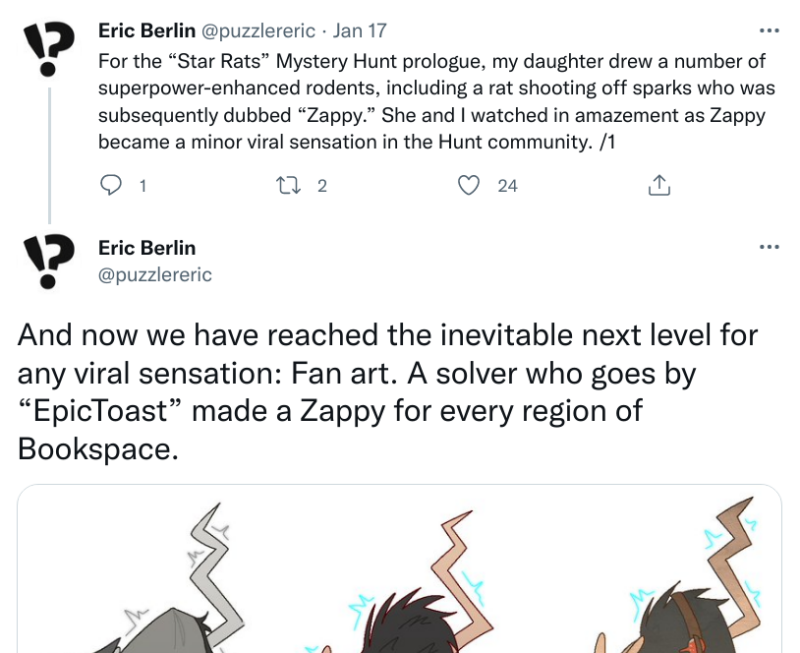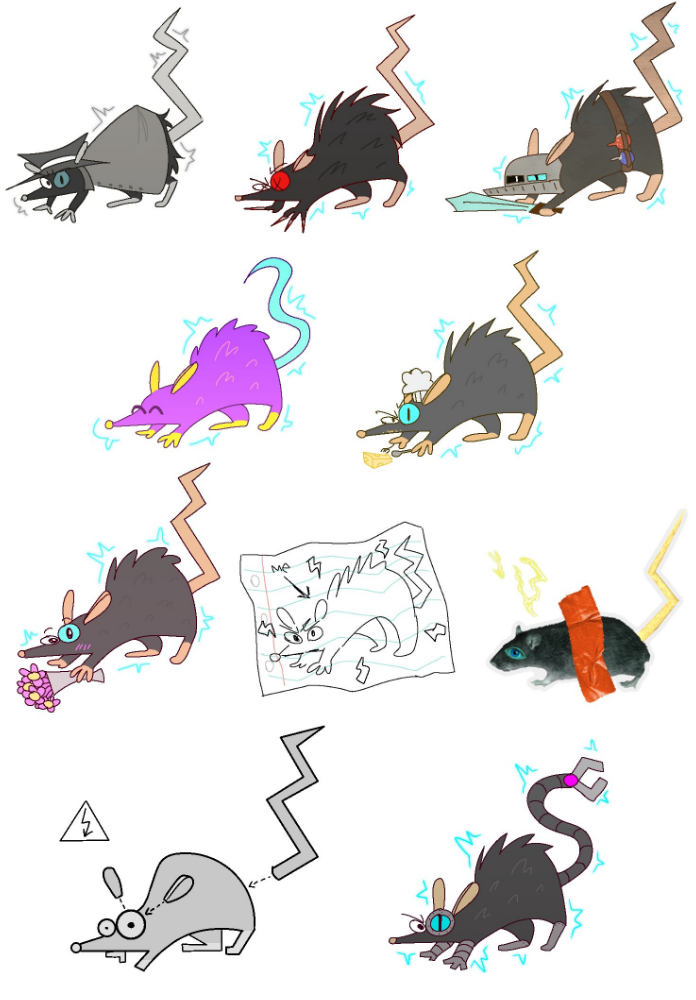
Two hundred puzzles, fifty people later by CJ Q. '23
✈✈✈ (pronounced whoosh) ✈✈✈ (pronounced nyeowww)
This post has spoilers for the theme and structure of MIT Mystery Hunt 2022, which are unmarked. This post has spoilers for some puzzles, which will be marked.
Titling these posts is beginning to be a challenge. Neither the 2020 Hunt, nor the 2021 Hunt, nor this hunt, have actually had two hundred puzzles; the number’s closer to 170. And our team doesn’t have fifty people; the number’s closer to 65. But this is a series, and I intend to see it through, no matter how ridiculous the titles end up being.
Thanks to ✈✈✈ Galactic Trendsetters ✈✈✈ for reading and giving comments on drafts of this post, and Alan for editing.
What it’s all about
Team culture
Spoilers for First You GO to…
Last weekend was the 2022 MIT Mystery Hunt, the world’s oldest, largest puzzlehunt, an event where hundreds of teams, with sizes anywhere from one to a hundred, work to solve roughly a dozen rounds of roughly a dozen puzzles each, of kinds ranging from jigsaw puzzle to Sudoku variant to protein-folding crossword to submitting ridiculous dance videos. I’ve written not one, but two posts about Mystery Hunt, so I won’t belabor the explanation here.
A puzzlehunt isn’t just about puzzles. For me, this weekend was as much about the two hundred puzzles as it’s about the fifty people I spent it with. Puzzlehunts, after all, are done in teams for a reason, and each team carries its own traditions, culture, and in-jokes.
One thing I love about the past two Hunts were the registration websites, which have a list of each of the teams. Not only can you read all the colorful team names, but many teams have opted to write a short description about themselves. We see team ☃, pronounced “Unicode Snowman”, with the description “Providing live testing of unicode support and alphabetization.” And then teams like Super Team Awesome, with description “🇹🇼 🥟 🍚 🏮 🥮 🀄 🎮 🐝.”
My team, ✈✈✈ Galactic Trendsetters ✈✈✈, has its own share of memes. Remember how I mentioned puzzles could be about anything, like submitting ridiculous dance videos? Well, one of the puzzles in this hunt was about submitting a Monopoly board based on your team. Andy made an excellent Galactic-themed Monopoly board, replete with all the in-jokes we have:
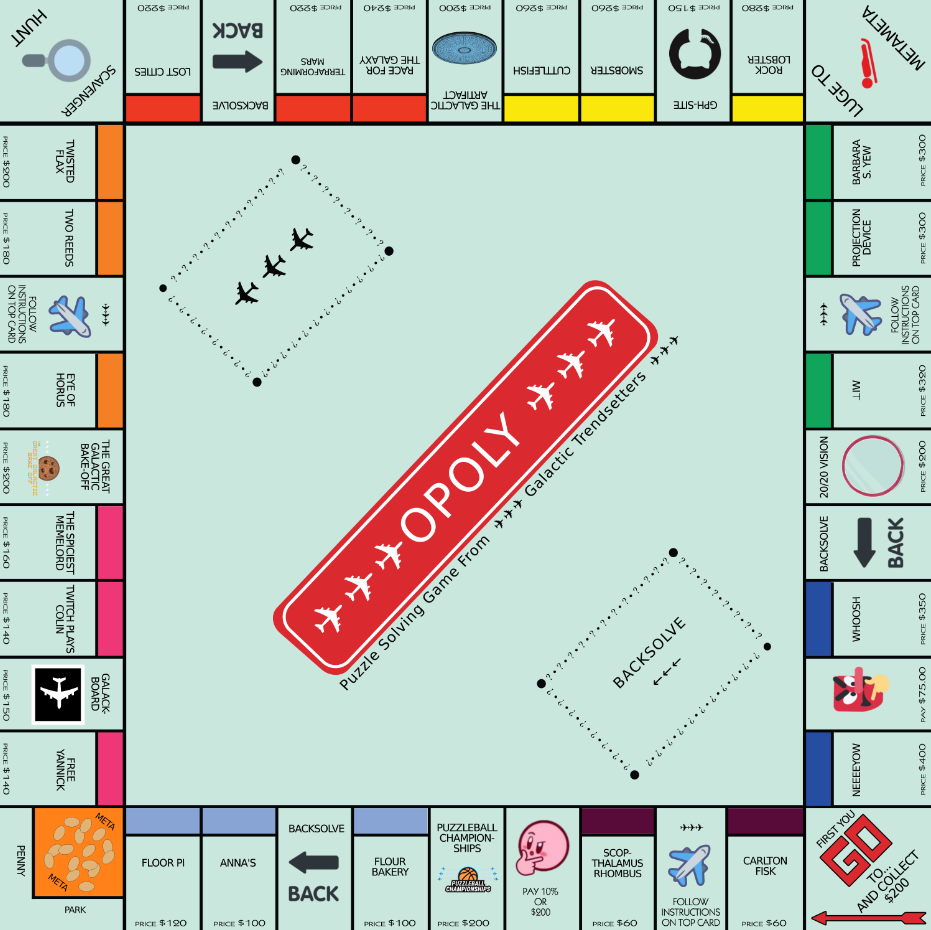
The trains were replaced with the four Galactic Puzzle Hunts. There’s Flour Bakery, Anna’s, and Floor Pi, three places dear to Galactic’s heart. There’s memes, Only Connect hieroglyphs, board games, Rock Lobster, and luge. And I can imagine each team that submitted their own board filled theirs with their own culture. Multiply that by the dozens of teams that solved this puzzle, and that’s years and years of stories.
The way that team culture forms reminds me a lot of MIT’s residential culture. Both have a self-selecting nature: you choose which teams to join, you choose which dorms to live in. You live with people and you make memes together, you hunt with people and you make memes together. I mean, the same observation could probably be made about a lot of things? Maybe my point is that this didn’t have to happen. Culture doesn’t come up just because people do something together, and so puzzlehunts have a special place in my heart for that.
The community
There’s a notion, becoming stronger in the past few years, of a general puzzling community, seen in places like /r/mysteryhunt. The community used to be based on large-scale in-person events such as DASH, Puzzled Pint, or BAPHL, and centered around the Mystery Hunt.
With the pandemic, many puzzlehunting traditions have stopped, while new ones have come up. Following the lead of the Galactic Puzzle Hunt, dozens of online hunts such as teammate or Silph have cropped up, with a huge growth in participation compared to years past. It’s the golden era of puzzlehunts; if there’s any time to pick up the hobby, it’d be now.
The Hunt, I think, is beginning to adapt around the growing community. This year, as a prelude to the Hunt, Palindrome released Star Rats a month in advance, to the surprise of many. After all, a writing team needs to make so many puzzles to write the Mystery Hunt alone; and they still found the time to write a prologue? While part of it may stem from wanting to include more puzzles in the Hunt without actually lengthening it, a better explanation might be to generate hype.
In the past, the extent of “hype-building”, if it could be called such, was releasing the registration site with some sort of theme wrapped around it, or sending a themed invitation to teams a week or so in advance. And this’d lead to some fun speculation about the theme of the Hunt, and what it’d look like, with writing teams through the years deciding to either subvert the theme predictions or play it straight. To release not just a puzzle, but a whole round of them, is unprecedented. And it paid off, because it got people talking!
People used to discuss pre-Hunt material with just their teams. But with the community gaining a social media presence, the discussion’s grown to anyone, across any team, causing things to go viral. As an example, Star Rats featured this little fella named Zappy, who’s served as the de facto mascot of this year’s Hunt. Look at them:
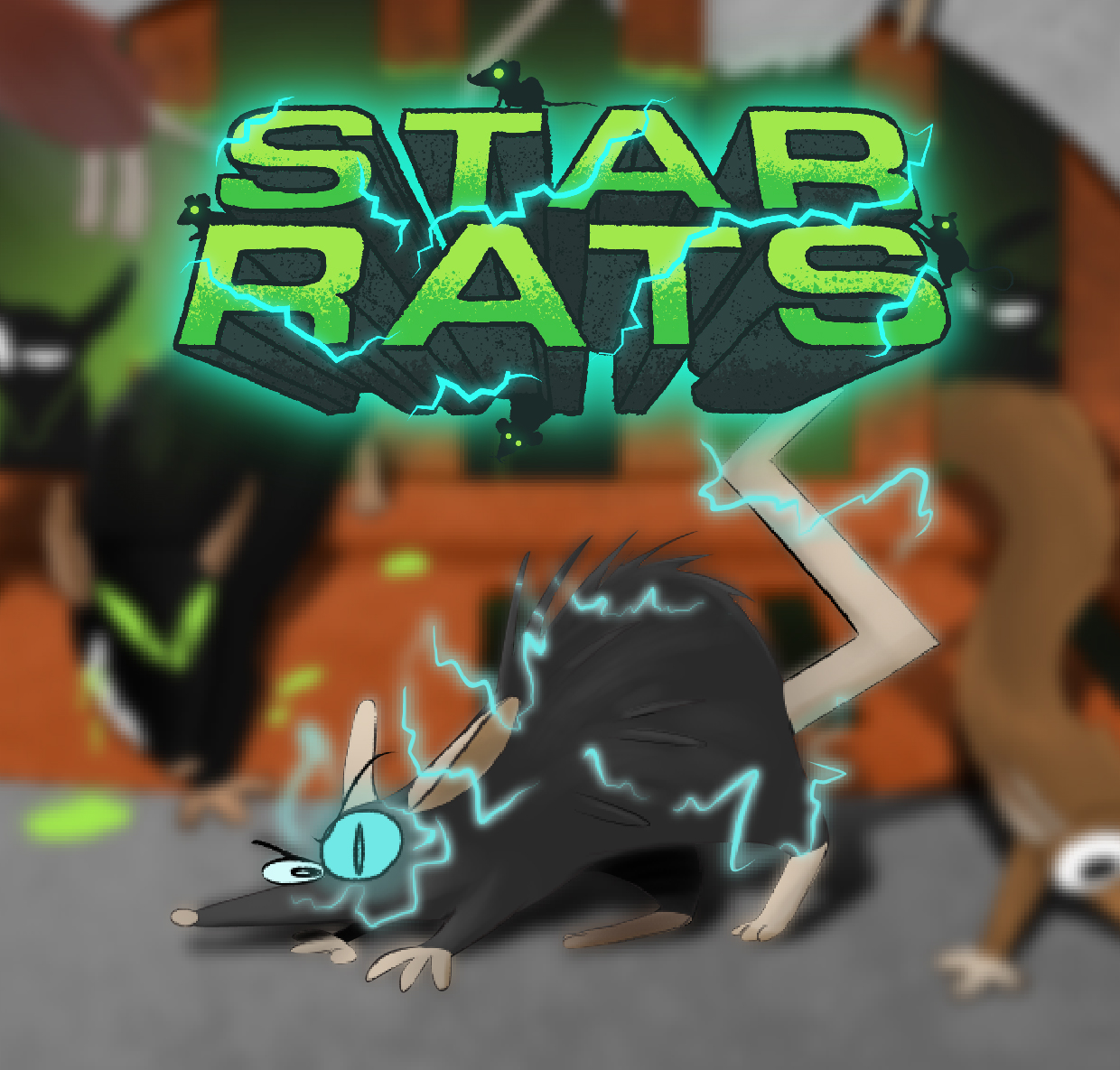
As Eric notes, we’ve seen the sign that it’s truly become a viral sensation: fan art:
We’re entering a new, exciting era: one where the Mystery Hunt isn’t a single-weekend event, but one that’s grown to weeks before and weeks after, one that encompasses not just the Hunt, but the many puzzlehunts that now happen over a year.
Hunt house
With another year of the Hunt going virtual, teams that would’ve normally gathered to meet in Cambridge had to make other plans. This year, Galactic decided to field two in-person meetups: one in Boston, and one in the Bay. I think roughly half our team was remote, a third in Boston, and the rest in the Bay.
The Boston group got an Airbnb for the weekend and set up sufficiently paranoid COVID policies. I had to show up on Thursday to show my negative PCR test, and I decided to stay for the night and hang out. The Hunt kickoff was Friday noon, but social activities start on Thursday evening, where in a usual year we’d have board game night in our team HQ. It makes sense, if you think of Hunt not just about solving puzzles, but as a reunion of sorts—Thursday night, you get to say hello and catch up with people before the puzzles begin.
When I showed up, there were maybe only six or so other people. The people who were out-of-state were carpooling together, and would arrive later that night. I showed Charles, who was in charge of COVID policy, my negative test, and then he gave me a sticker to put on this table with everyone’s names. Gold stars. Puzzlehunts are essentially grown-ups playing kids’ games.
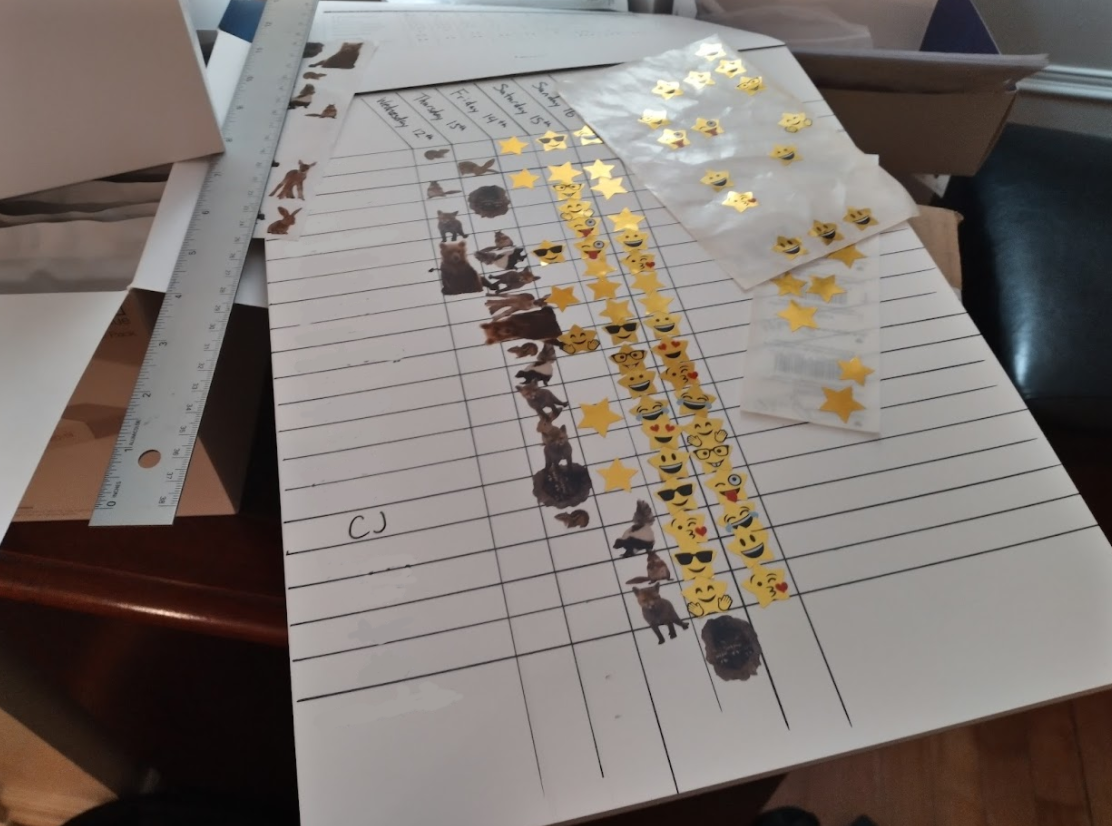
It’s weird to think about “catching up” with people—for many of them, the only other time we’ve met in-person was last Mystery Hunt, two years ago, and we otherwise have only interacted virtually. But that’s what it felt like nonetheless. Where are you living now? and What’s it like working for AoPS? and What do you feel about people watching you code?, the last question asked by Jakob while they and Alan were watching me code. For the record, as soon as I said I disliked it, they stopped watching.
More people arrived. We played board games. There was this trick-taking game and this mystery-themed hidden object game. I joined a round of It’s a Wonderful World, a 7 Wonders-esque drafting game with lots of cube counting. Charles had cooked lentil soup for us, which I had two bowls of; he mentions having to resist “putting his entire spice rack” in. Lillian baked cookies, enough for each of us to have two each.
It was a good, chill night. I walked back home, a forty-minute walk, but the night was nice and I didn’t mind at all.
Hunt proper
Friday: Kickoff
On Friday morning I ate some overnight oats, packed a power strip, and got dressed, wearing my brown ✈✈✈ shirt from two years ago. There’s the CT2 bus, which conveniently enough has a stop that’s a five minute walk from East Campus, and a stop that’s a five minute walk from the Airbnb we were staying in.
I settle into the living room, picking a nice sofa in front of the TV, and do another COVID test, as agreed upon. Discord notifications would pop up, each one a reminder of a Discord server I’d keep muted over the weekend. My life was on pause this weekend. The Hunt was a retreat from the rest of the world: this weekend would have me, the puzzles, and the hunters in Galactic. I greet people as they wake up, or come in.
“Good mrowing,” I said. I think that’s another in-joke.
On top of the TV was a webcam, which streamed a video feed of the living room to the Galactic Discord server. It was called the Boston spycam, and we had a similar thing in 2020 for the Galactic HQ. It was hooked up to a microphone, and the Discord voice channel was hooked up to the speakers, so it was like doing a call on speakerphone—we saw the remote hunters, and the people who gathered in the Bay, and the system worked pretty well.
As noon approached, we gathered around the TV to watch the kickoff. We laughed as the countdown made way to another countdown, bopped to the “energetic” background music, and speculated which parts would be puzzles. With the epic line “Star Rats is a stupid theme” (around twelve minutes in), the entire room went wild with excitement.
We did a group order for lunch from Flour Bakery and Cafe, which, as mentioned, is a part of Galactic’s culture (and to some extent floorpi’s). The food got delivered shortly before the puzzles were released. A lot of the solvers in Boston were excited to start solving, so most of the people who ordered food left theirs sitting on the floor for a bit. I decided I was more hungry than curious, so I grabbed my order and went to the kitchen to eat.
I see Anderson in the kitchen as well. He talks about how he hasn’t had Flour in so long, and I solemnly nod. For him it must’ve been months, if not years; for me, it was weeks. We took our time eating lunch and talking. We were at a pretty relaxed pace—not only was it the beginning of the hunt, with less puzzles available to work on, but Galactic did not want to win this year. Much that we had losecomm, a whole “committee” dedicated to making sure we lose.
The scene I saw when I came back would be the scene I’d see a lot through the weekend. People all on their laptops, many wearing earbuds or headphones, talking on voice calls to people across the country. Some are sprawled on the floor working on some physical puzzle, some are sitting next to each other and animatedly pointing at things on their screens. I come back to my seat, next to Mark, and ask what he’s working on. I forgot what he said. But I decided to work on the same puzzle, even if it already had a lot of people working on it.
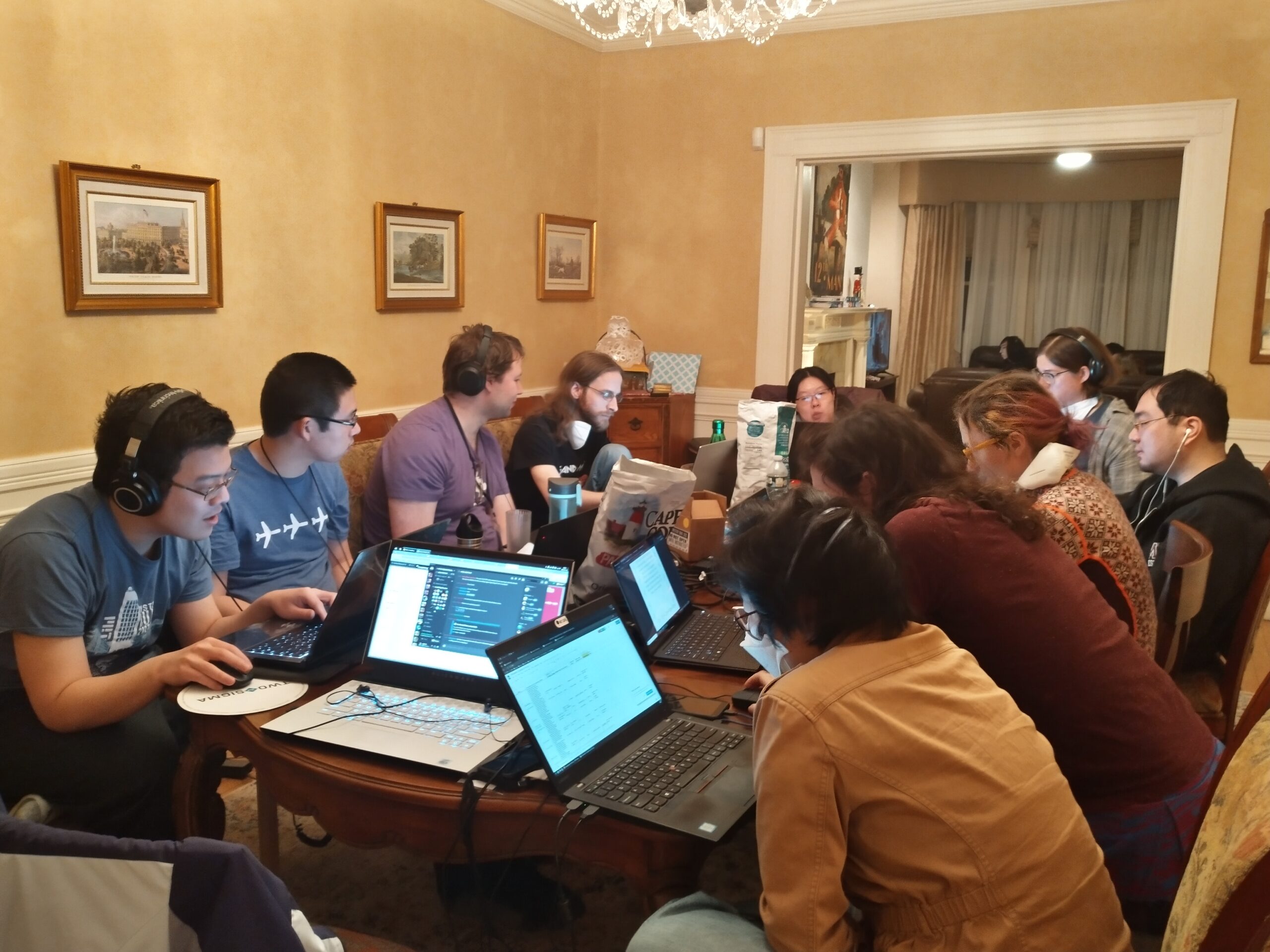
Around an hour into the hunt, maybe half past two, all the lights went out. The air filters stopped whirring and the internet went down. Was it a tripped breaker? Someone investigates—the breakers are all fine. Josh begins to dial the Airbnb’s owner, when Lillian informs everyone that it’s a blackout for the whole area, with expected restoration at four.
“Must’ve been the tornado at Hayden.”
“Losecomm’s doing their job, then.”
People laughed. Some people are intent with solving puzzles, setting up hotspots on their phone to rejoin their voice calls. While others, me and Mark included, didn’t want to work on puzzles while the power was out. Lilly proposed a board game or a puzzle, and so some people went and worked on that, while we waited for the power to come back. It was back up forty minutes later.
The rest of the afternoon was kind of a blur, which I guess is what happened during the 2020 Hunt as well. The puzzles just sort of blended together, and all my time perception got tossed out the window. I remember fragments: phrases like BUS DEICIDE, cross-talk at five in the afternoon. If it weren’t for people like Jakob going around and asking people if they’ve drank water recently, I swear I wouldn’t have remembered to. Soon enough, it was dinner. Charles had made some fried rice for everyone. It was really good.
I originally intended to go home that night, and Mark did too. Lillian advised us that if we did, we should probably not walk or something, given that it was negative ridiculous degrees outside, plus wind chill. And so I weighed the decision to stay: I could go home, and it’d be a painful trip back, or I could stay, but I wouldn’t have a change of clothes.
“I think I’ll stay. I can only be an irresponsible college student until I graduate.”
“Yeah. Enjoy it while you can.”
Saturday: Action
Spoilers for First You GO To…, ❤️ & ☮️, and Does Any Kid Still Do This Anymore?
I passed out on the couch at around midnight, and woke up at around nine. Although I kinda missed sleeping with Ice Bear by my side, it was a restful sleep nonetheless. I did another COVID test, ate a banana for breakfast, poured myself some trail mix from our impressively stocked snack cabinet, and started working on puzzles. For lunch, I got delivery with Mark, because it’s again negative ridiculous degrees outside, and the rest of the day was again a blur.
The round I remember most distinctly is New You City, a whole round centered on doing tasks. For example, the traditional the scavenger hunt was part of that round, which consists of doing several “book reports”, which are silly tasks intended to be interpreted creatively. I was drawn to the final task in the list—perform a lipsync featuring a reveal. I was reluctant at first, but someone else on the team invited me to do it with them, which was enough encouragement to do it.
On Saturday night, we presented our work to a panel of Palindrome members, Justin, Wayne, and Julia. Wayne and Julia are the Palindrome members who were also part of Puzzle Club, and I imagine they explicitly asked to judge our team, because they wanted to see me. In a sense, it was being judged by peers. Lilly led the presentations as a bunch of the Boston group gathered around the TV to watch. The scavenger hunt isn’t just about getting things done to get the answer to the puzzle—it’s one of the few opportunities to interact with the writing team.
The judging process consists of showing all our pictures and videos, while making snarky comments and giving witty justification for what we’ve done. For example:
“Well, I see everything, but where’s the girdle?”
“Ah. The girdle. It’s under the tunic, of course.”
Or:
“I can see that the CharlieCard is for scale, but is there another reason it’s there?”
“Well, you know how Charlie on the MTA stands inside the train and looks out the window? It’s kind of like a man looking out of a TV, hence the homage to TV Man.”
The final task we presented for Book Reports was our lipsync battle. It’s so glorious that I’ll link it here as well.
This led to the beautiful exchange:
“Okay, I’m not sure that was supposed to be strip Drag Race, but I guess it works.”
“Ah, ignore that, they’re just too straight to get it.”
It’s funny, I guess, that Hunt has been a venue to explore drag. In 2020, I dressed up as Angelyne, which was kinda like wearing a look. And this year, I did a lipsync! And I picked a drag name, Miss Terry, although admittedly only for the pun. I’ve always been interested in drag culture, being enough of a fan of Rupaul’s Drag Race to write a puzzle about it, but I’ve never thought of doing it myself. It was a fun experience, and I’m so grateful for the people who convinced me to do it.
Some tasks we had to do for New York City included making the Monopoly board mentioned, or making a parody of Eurovision-style songs, or shooting a Star Trek episode about Hunt. That last task was an excellent opportunity for Lilly to patiently explain to me what Star Trek was about, and then shoving all that out of the window to show things that were blatantly not Star Trek.
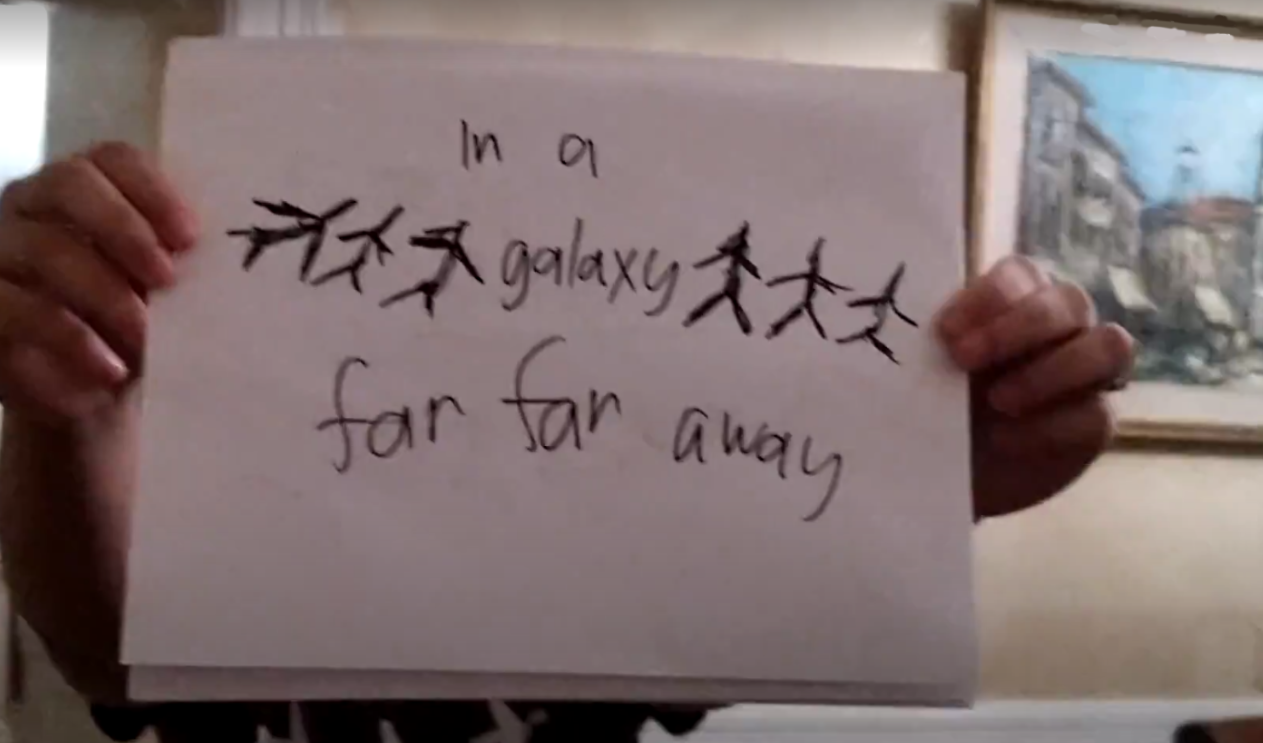
“that’s the wrong franchise!!” ok
Soon enough, it was dinner. Charles made dinner again. Bless his soul for making us so much dinner. I again decided to stay for the night—I was having too much fun here, and I would hate to waste a minute not working on puzzles with all the great people on Galactic.
Sunday: Climax
Spoilers for The Tollbooth.
On Sunday morning, we received an email that teammate won the hunt. This was a relief, because that meant we did not win, which was our goal. It was also announced that Hunt operations were closing at 6 PM, so if we wanted to get an interaction for finishing, we needed to finish the Hunt by then. That was seeming like a pretty huge goal.
We’d previously restricted ourselves from backsolving too much, and calling in answers we were less sure of. That last day, we wanted to see the end of the Hunt before 6 PM, which meant solving a bit more aggressively than we had been. We were looking at metapuzzles while having only half the answers for the round in an attempt to get through rounds as quick as possible. This led to some amazing meta solves. Overall, though, people seemed pretty doubtful we’d finish in time.
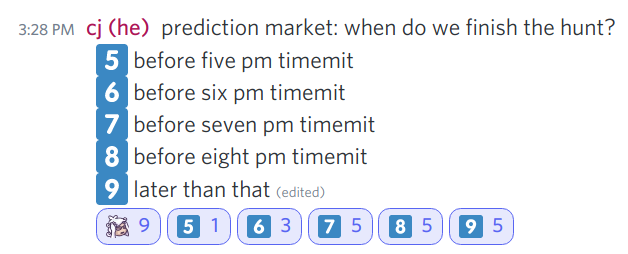
At around five in the afternoon, we’d solved all the Pen Station metas, except for Sci-Ficisco. We unlocked the Sci-Ficisco meta at half past five, and it seemed impossible for us to finish it by six. I felt that it was a rather tense race against the clock—perhaps if we finished it a few minutes after six, they’d still run the interaction for us. Half of the team was looking at the Sci-Ficisco meta, trying to figure out what was going on.
We didn’t solve it until half past six. It then took another hour to get through the endgame. There was a bit of memery at the end that reminded me of the 2020 Hunt’s metameta. We were all staring at the same, huge spreadsheet, solving so many things in parallel. We then realized the challenging final step we had to do, which led to this picture:
![]()
Our official finishing time was around half past seven. Some members from Palindrome, Justin, Julia, and Wayne, were kind enough to simulate the final interaction for us over a call. It provided a nice bit of closure, but I think I enjoyed it more for the discussion we had afterward. They asked us about our favorite things that happened, and we asked them questions about the Hunt. All in good fun. We wished them restful sleep, as we knew how stressful it was to run a Hunt, and the call ended.
At the Boston gathering, there was a lot of post-Hunt discussion: about puzzles, about next year, about what people were doing. Justine offered a ride home, so four of us living in Cambridge decided to go. I left that evening, knowing that it’d be a while before seeing people again—but that I would see them again, and that would be fun.
Final thoughts
Monday: Wrapup
I wake up, no longer on a couch, to a hurried message from Julia asking us to look over the wrapup slides for the Puzzle Club part. After a quick review and some breakfast, I sat down and watched the wrapup video.
Monday would be more defined by my interactions with the rest of Puzzle Club exec than with Galactic. We did some backchannel talk about the wrapup, and cheered for Wayne and Julia when they popped up. A few hours later, we had a long transition meeting with Palindrome and teammate, where we went over all the information that teammate needed to know to start working on the Hunt. It was a lot of information, and the meeting took a bit under two hours.
Puzzle Club exec also does weekly meetings on Monday night. We didn’t have an agenda for that night, given that Hunt just ended. So we spent the meeting just discussing the Hunt, talking about different teams and puzzles. A little work slipped in when we talked about how we needed to run elections for next year’s exec, and how we needed to start preparing for next year’s Hunt… but that could wait.
It’s now Thursday as I write this. Since then, Palindrome’s posted the Hunt credits, and teammate started a Discord with Palindrome and Puzzle Club exec. Some members of Palindrome streamed some discussion about the hunt, like Shai who talked about tech, or Justin who talked about art. Brian, who hunted with Galactic, wrote his post about the Hunt. And on Saturday, Palindrome will do an AMA on the /r/mysteryhunt subreddit.
While the Hunt may be over, the discussion definitely isn’t, and it won’t be over for a while. The puzzlehunt community I mentioned earlier? We’ll talk about Hunt for a good few weeks. And maybe the puzzle discussion will die down for a while, but soon enough, the next puzzlehunt will roll around.
Verdicts
I thought that Palindrome delivered an incredibly polished Hunt. The art was marvelous, hands-down the prettiest art that has graced the Mystery Hunt. The story worked, the video editing was amazing, the interactions and events were all great, and the tech worked perfectly. I’ve been absolutely floored by the Hunt production-wise, so props to the dozens of people who worked on that.
As for the puzzles proper, I thought that each of the puzzles were individually cool. My main gripe, and I would hate to pan this Hunt because this is a relatively minor gripe, is the relative balance of puzzle content. This comes down to personal taste, but I think there were a tad too many puzzles with cryptic clues, for example. But it’s refreshing to see what different teams do for the Hunt.
I loved the MIT theming on the Hunt. Despite being less explicitly about MIT than last year’s Hunt, it still felt like an MIT Mystery Hunt. From the beginning of the Hunt to the Ministry round, it felt like this was a Hunt that could’ve only been written for MIT, which I appreciated.
In general, I think the difference in Hunt goals was noticeable. For example, Galactic wanted to prioritize interaction with teams, which was why we had so many instances where we called up teams to run an interaction. This hunt had less of that. But I think Palindrome paid a lot of attention to the Hunt experience for teams of all sizes, which we saw in things like the three-act structure of the Hunt, to the opt-in puzzle unlocking instead of the automatic unlocking we did.
Why puzzles?
Here’s a question I’ll end the post with. Why puzzles? Not like, why do humans do puzzles. But more like, why does Mystery Hunt exist? And of all the things that it could be about, why is it about puzzles?
I find it extremely unusual that Mystery Hunt exists. It’s a huge event that happens every year. The hunt writers often do so much work that most teams don’t want to do it, or if they do, they don’t want to do it in rapid succession. Everyone involved in running it is a volunteer. Even for the participants, it’s rather strange. Few teams get to see the whole Hunt, and of those that do, each individual works on, maybe, at most a tenth of the puzzles.
I have some partial answers for this. For one, I think Mystery Hunt provides a stage to create a work of art unlike no other, which provides some value for a writing team. Individual writers probably have their own motivations, but I’ve heard that one talked about a decent amount.
Why do people do Mystery Hunt? Puzzles themselves are satisfying, but I think it’s more of the fact that people can bring different things to the table when it comes to solving a puzzle. Some people find satisfaction in having ahas, some find satisfaction in gathering data. With the Hunt itself being so large, the variety of puzzles means that participants can find a puzzle that feels personal.
If that’s true, then why don’t all teams hunt remotely? After all, if it’s just about the puzzles, there’d be no reason to show up in-person or do things like that. So there has to be something more to it. And I think a good reason is a simple one: people do Mystery Hunt because they have friends who do it. It’s a convenient excuse to meet up with people you haven’t seen in a year, and talk, and catch up.
It’s not as if this is something unique to puzzles. It’s true for many other hobbies, as well. Yet there’s something about puzzles that feels a bit more… universal to me. Perhaps not as universal as liking baseball, sure, but it sure is convenient that a lot of my friends are nerds and a lot of nerds like puzzles. If you kept everything about puzzlehunts the same but removed all my friends, then I wouldn’t want to do it. I can’t understand wanting to do puzzles in a vacuum.
It’s a community that changes a list of puzzles into a full-fledged puzzlehunt. I wouldn’t have it any other way.
